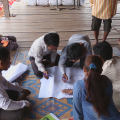MRC's role in transboundary dialogue in the Mekong Basin: An interview with MRC’s Chief Strategy Officer
As an intergovernment facilitating and advisory body, the Mekong River Commission (MRC) works directly with the governments of Cambodia, Lao PDR, Thailand and Vietnam to jointly manage the shared water resources and the sustainable development of the Mekong River. But recently, the role of the MRC to protect the Mekong River and promote inter-basin cooperation has come under increasing scrutiny.
SUMERNET interviewed the MRC’s Chief Strategy & Partnership Officer, Dr Anoulak Kittikhoun (pictured above), for his views on the MRC’s role in the Mekong River Basin and how to improve transboundary dialogue and cooperation in the future.
Q: MRC has recently released its “State of the Basin Report 2018”, an important assessment for the basin countries of both positive and negative impacts of development. What are the key messages of this report in your opinion?
A: In my opinion, the key message is that the overall economic conditions in the basin are positive. The countries continue to display solid economic growth along with declining poverty, improved living conditions and increasing productivity.
However, population growth and the associated demographic changes, together with other major drivers such as environmental degradation, industrialization, the effects of dams and other water infrastructure on fisheries and sediment, along with climate change, are putting increasing pressures on the Mekong River’s ecosystems.
Q: One cannot talk about the Mekong River without being reminded about hydropower. Dam-building continues to be a source of controversy and tension both among governments as well as with local communities dependent on the river ecosystems especially fisheries. The 1995 Mekong Agreement requires that such projects “are discussed extensively among all four countries prior to any decision being taken.” Do you think this “regional cooperation” and discussion among countries is genuinely happening in your opinion? What more is needed?
A: Definitely. The Mekong Basin is fortunate to have the 1995 Mekong Agreement. Without this agreement, and the MRC and its procedures for consultation, it would not be possible for the major mainstream dam projects of a sovereign country to be openly consulted. Thousands of pages of project documents would never have become public. The countries, the public and stakeholders would never have had a chance to participate and openly raise their voices and have their views recorded as part of a legitimate consultation process, and without harassment.
Moreover, without this consultation process, assessments and studies of the private developers would never have been reviewed and independent opinions provided. The dam designs and mitigation measures to avoid and mitigate impacts would have never been considered systemically. If you look at river basins in Africa or South Asia, or even Europe in the past, these things rarely happen.
But the process can be improved, and the MRC is working on improvements. The riparian countries and related stakeholders need to continue to work together to ensure things get better and better. For example, we need more time for review and consultation, more opportunities to dialogue towards improving the mitigation measures and monitoring of changes in the river.
Q: At present, there are many bilateral and regional networks and initiatives. This was not the case in 1995 when the MRC Agreement emerged as the sole mechanism for transboundary cooperation. Now China is very active with the Lancang-Mekong Cooperation (LMC) initiative. How do you see the role of MRC in this changing context of increased transboundary institutions and dialogue processes? How is the MRC aiming to be of continued relevance in the Mekong Basin?
A: The MRC is still the only treaty-based international river basin organization with a clear mandate to promote and coordinate the sustainable development and management of the Mekong River Basin. The MRC has an extensive suite of strategies, guidelines, procedures, and knowledge to guide the riparian countries. It has been in existence for almost 25 years, building on cooperation lasting over 60 years. The MRC is here to stay and our member countries have agreed to put more financial resources into the MRC year after year. International partners are fully committed to the MRC. The LMC is a good initiative and we think it would complement the work of the MRC when it comes to bringing together all the six riparian countries for dialogue towards developing and managing the Lancang-Mekong River.
The LMC is much more than the Mekong River and the cooperation extends to many areas. As a sign of cooperation, the MRC Secretariat now participates in the LMC Joint Working Group on water resources and is signing an MOU with the LMC Water Center. The MRC is also reinvigorating its data, information, modelling, forecasting and communication systems in order to response to the needs of riparian countries and the changes in the Mekong Basin.
Q: The impacts of climate change are of huge concern in the Mekong Basin. The most recent data and models predict continued warming, increased climate variability, and frequent and damaging extreme weather events like droughts, floods, and storms. Tell us about the MRC’s plans for climate adaptation in the Mekong Basin?
A: We have a Mekong Climate Change Strategy and Action Plan that is being implemented at regional and national levels. We just have approval for our Drought Management Strategy, in particular a response to this year’s historic low flows. Next year we will update our Flood Management and Mitigation Strategy. As stated above, to provide more timely and accurate information in terms of forecasts and studies of impacts, MRC is reinvigorating its data, information, modelling, forecasting and communication systems.”
Q: What in your opinion are the key challenges in the future for the work of the MRC to achieve enhanced dialogue and transboundary cooperation? What would you like the MRC to do better?
A: The key challenges, and opportunities, are pro-active regional/basin-wide planning, coordination of operations of mainstream and tributary projects, data and information collection and management, and enhanced cooperation between MRC and all the relevant regional cooperation frameworks. The MRC is updating the Basin Development Strategy and MRC Strategic Plan for the next 5-10 years to address these challenges and take advantage of these opportunities in collaboration with our member countries, partners and stakeholders.
Info
This story is part of the following project
SUMERNET 4 All: Engaging with water insecurity in the Mekong Region
Country
Related people
You might be interested in
-
SUMERNET Vision Guide introducing the new phase "SUMERNET 4 All"
The new, revised "Vision Guide" for SUMERNET is now available. This vision guide presents an overview of SUMERNET - its origins and governance structure, background to the network, aims, key research areas, engagement with policy, and outreach products
![SUMERNET Vision Guide introducing the new phase "SUMERNET 4 All"]()
-
SUMERNET 4 All Call for Proposals on Joint Action
SUMERNET 4 All (S4A) provides financial support and technical assistance to consortia of researchers and boundary partners from the Mekong Region
![SUMERNET 4 All Call for Proposals on Joint Action]()
-
SUMERNET launches redesigned website to provide a fresh visual look and direction
SUMERNET is proud to announce the launch of our redesigned website to coincide with our new phase of work on addressing water insecurity in the Mekong Region.
![SUMERNET launches redesigned website to provide a fresh visual look and direction]()
 By
By 



 Read more about SUMERNET
Read more about SUMERNET
